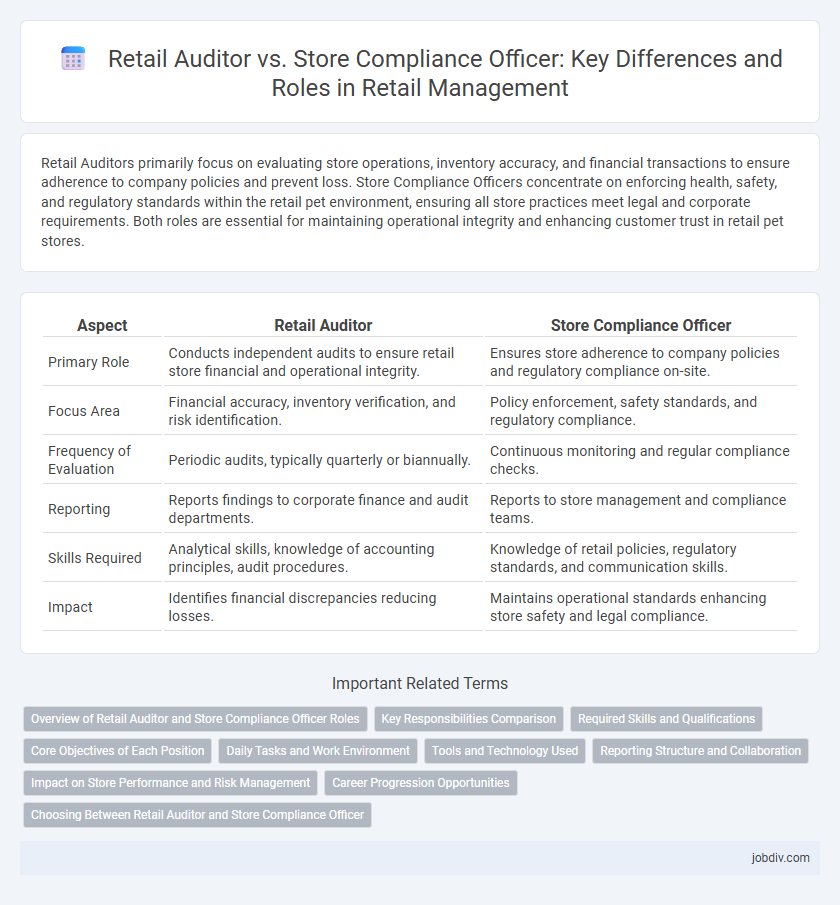Retail Auditors primarily focus on evaluating store operations, inventory accuracy, and financial transactions to ensure adherence to company policies and prevent loss. Store Compliance Officers concentrate on enforcing health, safety, and regulatory standards within the retail pet environment, ensuring all store practices meet legal and corporate requirements. Both roles are essential for maintaining operational integrity and enhancing customer trust in retail pet stores.
Table of Comparison
| Aspect | Retail Auditor | Store Compliance Officer |
|---|---|---|
| Primary Role | Conducts independent audits to ensure retail store financial and operational integrity. | Ensures store adherence to company policies and regulatory compliance on-site. |
| Focus Area | Financial accuracy, inventory verification, and risk identification. | Policy enforcement, safety standards, and regulatory compliance. |
| Frequency of Evaluation | Periodic audits, typically quarterly or biannually. | Continuous monitoring and regular compliance checks. |
| Reporting | Reports findings to corporate finance and audit departments. | Reports to store management and compliance teams. |
| Skills Required | Analytical skills, knowledge of accounting principles, audit procedures. | Knowledge of retail policies, regulatory standards, and communication skills. |
| Impact | Identifies financial discrepancies reducing losses. | Maintains operational standards enhancing store safety and legal compliance. |
Overview of Retail Auditor and Store Compliance Officer Roles
Retail Auditors evaluate store operations, financial transactions, and inventory accuracy to ensure adherence to company policies and detect discrepancies. Store Compliance Officers focus on enforcing regulatory standards, safety protocols, and company guidelines to maintain store integrity and legal compliance. Both roles collaborate to optimize retail performance, with auditors emphasizing financial accuracy and compliance officers prioritizing operational standards.
Key Responsibilities Comparison
Retail Auditors primarily focus on evaluating financial records, inventory accuracy, and adherence to company policies through comprehensive audits. Store Compliance Officers ensure that retail operations comply with legal standards, safety regulations, and internal store policies by conducting regular inspections and staff training. Both roles are essential for mitigating risks, enhancing operational efficiency, and maintaining regulatory compliance within retail environments.
Required Skills and Qualifications
Retail auditors require strong analytical skills, proficiency in data analysis software, and expertise in financial auditing to ensure accuracy in inventory and sales reporting. Store compliance officers need a thorough understanding of regulatory standards, excellent communication abilities for training staff, and skills in risk assessment to enforce policies effectively. Both roles benefit from attention to detail, problem-solving capabilities, and experience in retail operations.
Core Objectives of Each Position
Retail Auditors focus on systematically evaluating store operations, financial records, and inventory accuracy to ensure compliance with corporate policies and identify discrepancies or fraud risks. Store Compliance Officers prioritize enforcing store-level adherence to health, safety, and regulatory standards, conducting regular inspections, and implementing corrective actions to maintain operational integrity. Both roles are essential in safeguarding organizational standards but target different aspects of store performance and accountability.
Daily Tasks and Work Environment
Retail Auditors conduct detailed inspections of store operations, focusing on inventory accuracy, financial discrepancies, and adherence to corporate policies, often traveling between multiple retail locations. Store Compliance Officers primarily monitor daily store activities to ensure health, safety, and regulatory standards are met, maintaining communication with management to address violations swiftly. Both roles require strong attention to detail and adherence to company protocols but differ in scope, with Retail Auditors emphasizing financial and procedural audits and Compliance Officers focusing on operational and regulatory compliance within a single store environment.
Tools and Technology Used
Retail Auditors leverage advanced data analytics software and mobile auditing apps to systematically evaluate store performance and financial accuracy. Store Compliance Officers utilize real-time monitoring systems, compliance management platforms, and digital checklists to ensure adherence to regulatory standards and operational protocols. Both roles increasingly depend on cloud-based solutions and AI-driven technologies for efficient data collection, reporting, and risk assessment in retail environments.
Reporting Structure and Collaboration
Retail Auditors typically report to the Finance or Internal Audit departments, ensuring financial accuracy and regulatory compliance, while Store Compliance Officers usually report to Store Management or the Compliance Department, focusing on operational adherence and policy enforcement. Collaboration between these roles centers on sharing audit findings and compliance issues to maintain overall store integrity and mitigate risks. Effective communication channels enhance transparency, enabling coordinated efforts to address discrepancies and improve retail processes.
Impact on Store Performance and Risk Management
Retail Auditors enhance store performance by systematically verifying financial accuracy, inventory levels, and operational adherence, reducing shrinkage and boosting profitability. Store Compliance Officers focus on enforcing regulatory standards and company policies, minimizing legal risks and ensuring brand reputation is maintained. Together, they mitigate risks through comprehensive audits and consistent compliance checks, driving operational efficiency and safeguarding store assets.
Career Progression Opportunities
Retail Auditors primarily advance through roles in risk management, financial analysis, and corporate compliance, gaining expertise in auditing processes and regulatory standards. Store Compliance Officers often progress into senior management positions within retail operations, such as compliance director or regional store manager, leveraging their knowledge of legal requirements and on-site enforcement. Career progression for both roles depends on developing specialized skills in audit methodologies, regulatory frameworks, and operational leadership within the retail industry.
Choosing Between Retail Auditor and Store Compliance Officer
Choosing between a Retail Auditor and a Store Compliance Officer depends on an organization's priorities: Retail Auditors specialize in financial accuracy, inventory verification, and sales data integrity to prevent shrinkage, while Store Compliance Officers focus on ensuring adherence to company policies, regulatory standards, and operational procedures to mitigate risks. Businesses aiming to strengthen financial oversight and detect internal fraud might prioritize hiring Retail Auditors, whereas those emphasizing regulatory compliance, employee conduct, and store safety would benefit more from Store Compliance Officers. Evaluating the specific needs for auditing precision versus compliance enforcement guides the optimal staffing decision in the retail sector.
Retail Auditor vs Store Compliance Officer Infographic

 jobdiv.com
jobdiv.com